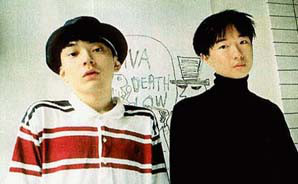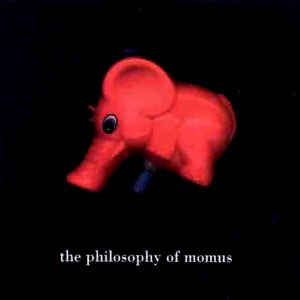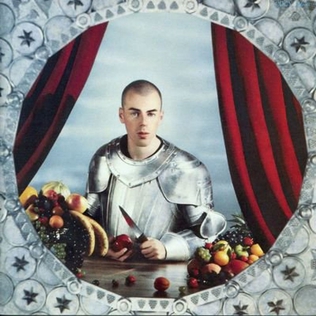
Nicholas John Currie, more popularly known under the artist name Momus, is a Scottish musician and writer.

Shibuya-kei is a microgenre of pop music or a general aesthetic that flourished in Japan in the mid-to-late 1990s. The music genre is distinguished by a "cut-and-paste" approach that was inspired by the kitsch, fusion, and artifice from certain music styles of the past. The most common reference points were 1960s culture and Western pop music, especially the work of Burt Bacharach, Brian Wilson, Phil Spector, and Serge Gainsbourg.

Flipper's Guitar (フリッパーズ・ギター) were a Tokyo-based rock band led by Keigo Oyamada and Kenji Ozawa. The band were influenced by the chirpy sound of British 80s pop and post-punk groups like Haircut 100, Exhibit B, Orange Juice, The Style Council and Aztec Camera, as well as the fashionably eclectic sounds of early 90s Britain, from alternative dance to acid jazz.
Mari Hiki, better known by her stage name Kahimi Karie, is a Japanese singer, songwriter and photographer. Her music is closely associated with the Shibuya-kei aesthetic. Karie sings in English, French and Japanese, among other languages.
Yukari Fresh, is a Shibuya-kei artist.

K.K.K.K.K. is the second studio album by Japanese musician Kahimi Karie. It was released on July 15, 1998 by Crue-L Records and Polydor Records. In the United States, K.K.K.K.K. was issued on October 26, 1999 by Le Grand Magistery, following Kahimi Karie (1998) as Karie's second American album release.

Larme de Crocodile is the debut studio album by Japanese musician Kahimi Karie. It was released on March 25, 1997 by Crue-L Records.

Kahimi Karie is a compilation album by Japanese musician Kahimi Karie. It was released on September 8, 1998 by Minty Fresh in the United States, serving as her debut album in the country. Kahimi Karie primarily consists of tracks from Karie's previous EPs and singles, excepting one track taken from her 1997 debut album Larme de Crocodile. It utilizes the cover art from Karie's 1995 EP My First Karie.

Tilt is the third studio album by Japanese musician Kahimi Karie. It was released on May 24, 2000, by Polydor Records.

K.K. Works 1998-2000 is a compilation of tracks by Kahimi Karie recorded in the title years. It was issued in 2001 by the Japanese major label Polydor.
Hirohisa Horie is a Japanese musician and multi-instrumentalist. He plays primarily keyboards and guitar. Horie is one half of the Shibuya-kei duo Neil & Iraiza, and is known for his work with artists such as Kahimi Karie and Cornelius.
él is an English independent record label based in London that was founded by Mike Alway, later becoming a subsidiary of Cherry Red Records. Their musicians were characterized by a strong English sensibility, as well as the French influence stemming from in-house writer/producer Louis Philippe. During their original run, él received much interest from the press, but not a huge number of sales, except in Japan, where the label became an enormous influence on J-pop acts like Cornelius and Pizzicato Five. The label closed in 1989. In 2005, it was revived as a reissue label.

Ping Pong is the eleventh studio album by Scottish musician Momus, released in 1997. It has been described as the beginning of his "analog baroque" style.

The Poison Boyfriend is the second album by Scottish musician Momus, released in 1987 on Creation Records. After the critical success of Momus' Biblical-themed and stripped down debut album Circus Maximus (1986), Momus left él Records and signed with Creation Records after he bonded with record label boss Alan McGee. His first release for the label, The Poison Boyfriend is a song cycle that features a full band; its first half features acoustic-based singer-songwriter songs with cabaret pop influences, while the more upbeat second half features synthesisers and drum machines.

Hippopotamomus is the fifth studio album by British musician Momus, released in 1991 through Creation Records.

Ocky Milk is the 19th studio album by Scottish musician Momus. It was released on 10 March 2006 through Momus' own label, Analog Baroque, and re-issued through independent label American Patchwork. It is currently distributed on CD by Darla Records.

Don't Stop the Night is the fourth studio album by Scottish musician Momus. It was released in 1989 through Creation Records internationally, and in Germany on Rough Trade. The album featured Momus' highest-charting single to date, "The Hairstyle of the Devil", which reached No. 94 on the UK Singles Chart for the week of 30 April 1989.

The Philosophy of Momus is the ninth studio album by Scottish musician Momus. It was released on 1 April 1995 through Nippon Columbia in Japan, and Cherry Red Records in the United Kingdom.

Timelord is the eighth studio album by Scottish musician Momus. It was released in October 1993 through Creation Records in Europe and Nippon Columbia in Japan.

Poison Girl Friend, stylized as POiSON GiRL FRiEND, is a musical solo project by Noriko Sekiguchi. A singer, songwriter, composer, producer and DJ based mainly in Japan, she formed The Poison Girl Friends in 1990 with her friends. However, by end of 1991, it became her solo unit as Poison Girl Friend. The name has been since commonly used as an alias for Noriko.
















